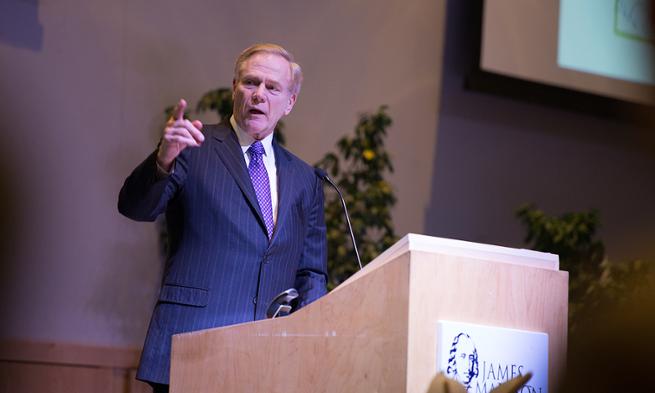Understanding the Peace Process
Nation and World
SUMMARY: During the Clinton Administration, Jan Lodal, principal deputy under secretary of defense for policy, was a key participant in U.S. decision-making. In his keynote address for the Intelligence and the Transition from War to Peace conference at JMU, Lodal provided a senior official's perspective on the Bosnian Conflict.
Selected remarks from the Keynote Address by Jan Lodal
During the Clinton Administration, Jan Lodal, principal deputy under secretary of defense for policy, was a key participant in U.S. decision-making. In his keynote address for the conference, Intelligence and the Transition from War to Peace, Lodal provided a senior official's perspective on the Bosnian Conflict.
'We are much more likely to resolve these conflicts if early on we understand the environment and culture we are operating in. '
"The Dayton Accords were much more than a cease fire," said Lodal. "Dayton created a governmental structure that has lasted for nearly 20 years and given the people of Bosnia-Herzegovina the absence of war, and because of that, a chance to return to their homes with a hope for a place in a prosperous democratic multi-ethnic, tolerant Europe."
Lessons of Bosnia
Lodal noted the Bosnia experience was distinguished by ethnic and sectarian struggles combined with a history of colonial rule that left warring factions inside artificial national boundaries, which impeded the establishment of stable self-governance. "These characteristics contrast with wars between established states or wars of conquest. The lessons of Bosnia, Lodal said, "are much more likely to apply to future conflicts of this nature rather than what one might call "traditional" wars between established states."
'Like it or not, peace after war requires nation building.'
Lodal acknowledged that "the aftermath in Bosnia has been rough indeed. ... Like it or not, peace after war requires nation building. When we've gotten it right --Germany, Japan, and Bosnia--we've enjoyed the fruits of our efforts. But when the international community abjures its role, we pay a very heavy price." Since the type of conflict in Bosnia and other such states are more difficult to resolve, Lodal pointed to the need for the U.S. to "get commitment early on from our own political system to carry through on all the aspects of what needs to be done to achieve a durable peace. There is no way to do that perfectly. While there will be bumps in the road, we can do a much better job than we have in the past."
Responding to a question about lessons to be learned from Bosnia posed by Laura Walters, a JMU student and representative of the Public Affairs Student Organization, Lodal encouraged better cross-cultural education. "Perhaps the most important is that we are much more likely to resolve these conflicts if early on we understand the environment and culture we are operating in. Personally, I believe it will never be possible for the intelligence community to handle this task by itself. The best hope is a better integration of our intelligence analysts, and even our collection methods, with universities and think tanks. [Within] the United States academic community ... every culture and every language is understood along with the history, politics and diplomatic challenges of every nation. There is so much more expertise collectively in these institutions than the intelligence community could ever afford. ... Some of that has begun with programs that you have here at James Madison University. This conference can help lead the way to further cooperation.
